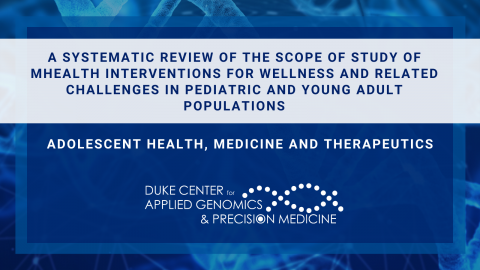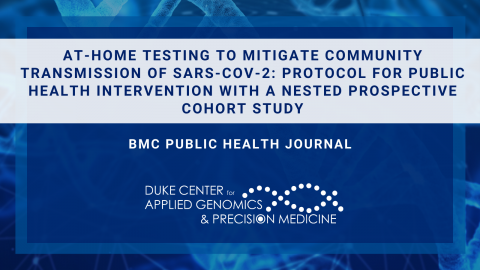Haga authors "The Book of Genes and Genomes"
Susanne B. Haga, PhD, associate professor of medicine and co-director of educational programs at the Duke Center for Applied Genomics & Precision Medicine has authored a new book, "The Book of Genes and Genomes" providing readers an easy to understand overview of the advances in genetics and genomics.
Bass Connections team publishes study on mobile health interventions in pediatric and young adult populations
The Bass Connections Precision Medicine team, working with faculty mentor Susanne B. Haga, PhD, from the Duke Center for Applied Genomics & Precision Medicine, recently published their analysis of mobile health (mHealth) intervention studies published between 2015 and 2019.
Early exercise interventions used from Duke trial to decrease cardiovascular disease
With 2022 underway and we are still living a relentless pandemic, our health continues to be of the upmost importance and physical activity has been shown to not only improve health, but help prevent the onset of many diseases.
In February we celebrate and raise awareness for Heart Month, a time when the national spotlight is on cardiovascular disease.
One cardiologist at Duke focused on heart disease, specifically from a preventative standpoint, is Dr. William E. Kraus.
Celebrating International Day of Women and Girls in Science: The women who make CAGPM science possible
In celebration of International Day of Women and Girls in Science, we are highlighting some of the inspiring women at Duke’s Center for Applied Genomics & Precision Medicine (CAGPM.) We spoke with them to learn more about their careers and what excites them about genomics.
CAGPM’s MeTree software recommended by President’s Cancer Panel
More effective and equitable implementation of cancer screening represents a significant opportunity for the National Cancer Program, with the potential to reduce the burden of cancer, according to a report released February 2, 2022, by the President’s Cancer Panel. The Panel’s report, Closing Gaps in Cancer Screening: Connecting People, Communities, and Systems to Improve Equity and Access, presents goals and recommendations to optimize cancer screening informed by a series of meetings conducted 2020-2021.
Woods publishes "At-home testing to mitigate community transmission of SARS-CoV-2"
The Duke Center for Applied Genomics & Precision Medicine’s Associate Director, Christopher W. Woods, MD, co-authored a recent publication in the BMC Public Health Journal studying the impact of rapid at-home testing on COVID-19 trends, “At-home testing to mitigate community transmission of SARS-CoV-2: protocol for public health intervention with a nested prospective cohort study.” This non-pharmaceutical intervention remains critical to controlling disease transmission and can ease the burden associated with facility-based testing. At-home testing can additionally improve testing access in high-risk communities. This study evaluates the impact that at-home testing has on both COVID-19 transmissions and socio-behavioral patterns in underserved populations.
Surprise! The Pandemic Has Made People More Science Literate
More effective and equitable implementation of cancer screening represents a significant opportunity for the National Cancer Program, with the potential to reduce the burden of cancer, according to a report released February 2, 2022, by the President’s Cancer Panel. The Panel’s report, Closing Gaps in Cancer Screening: Connecting People, Communities, and Systems to Improve Equity and Access, presents goals and recommendations to optimize cancer screening informed by a series of meetings conducted 2020-2021.
CAGPM Spotlights: Get to Know Our People
Over the past few months, we talked with some CAGPM team members to get to know them a little better — their roles in the center, what excites them about their work, and some words of advice.
Rapid Test Identifies Antibody Effectiveness Against COVID-19 Variants
Test could measure patient immunity against multiple COVID-19 variants such as Omicron and Delta at once and inform which synthetic monoclonal antibody to use for treatments.
Duke multi-disciplinary team’s collaboration reveals common and unique viral responses enabling potential for future early testing opportunities
The future of discovery in the world of research goes beyond the walls of core teams. Collaboration across institutions, countries, and around the world will answer the biggest questions in years to come.









